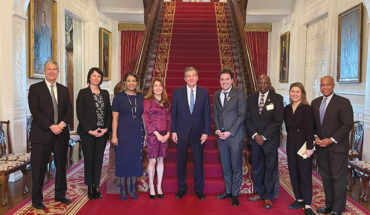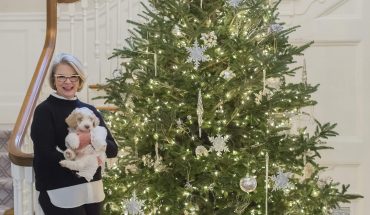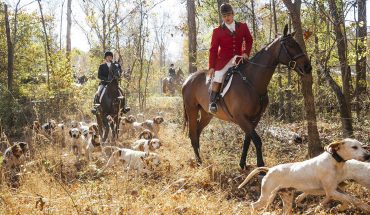by Liza Roberts
photographs by Jimmy Williams
One day after a new hybrid orchid named for Allyson Duncan was accepted by the Royal Horticultural Society, she wore a suit of the same color to welcome visitors into her spacious corner office. She showed off a potted five-foot tree she grew from the seed of an orange. She pointed out a terrestrial orchid she propagated from a clipping and an African violet she rescued from a heap of trash.
Duncan, 62, is not a horticulturalist; she is a judge. A federal judge at the pinnacle of her career, a multi-faceted, private woman with a laundry list of “firsts” to her name – and a profile almost as low as her accomplishments are high.
She is the first African-American woman and the first woman from North Carolina to sit on the influential U.S. Court of Appeals for the Fourth Circuit. She was the first African-American president of the N.C. Bar Association. The former N.C. Utilities Commissioner was also first in her class at Hampton University, and an Earl Warren Scholar at Duke University’s law school. She was nominated to the federal bench by President George W. Bush, and confirmed in 2003 with a unanimous 93-0 vote by the U.S. Senate.
“This is a woman of extraordinary intellect and skill, who loves the law, strives for justice, and never allows politics to interfere with her commitment to equality,” said Senator John Edwards on the chamber floor, when her name came up for a vote.
She will tell you that the bipartisan praise, the accomplishments, all of these firsts – and the list here is partial – is “just a function of the fact that I’m old.” She laughs, but she’s serious: “I just came along at a time when there hadn’t been an African-American president of the Bar Association, for example. Some of these distinctions were probably late in coming.”
Her self-effacement is reflexive, born of a gracious modesty that keeps her voice soft, her thoughts considered, and her story little-known. Slender and refined in a classic suit, surrounded by the plants she’s grown, mementos from trips abroad, and a collection of tasteful art, Duncan strikes an elegant figure.
As her resume will attest, she is also as steely-determined as they come. “You could say driven, and I couldn’t argue with that,” she says, with a slight smile. The only child of an intent woman some today might describe as a “Tiger Mother,” Duncan says she was molded by exacting expectations.
“The way she was raised, you had to be better,” says Betty Blackmon, a close family friend who has known Duncan since 1962, when Blackmon was a young married mother and Duncan was 10. “As a black person and as a woman, you had to strive to be better. That was instilled in us. And she was always equipped to be better.”
“She prodded and demanded,” Duncan says of her mother, Anne Duncan, while her father “simply adored.” It was “nice to have one of each.” Both parents worked at N.C. Central University. Her mother was the law librarian and taught legal research and writing, while her father served as superintendent of buildings and grounds.
If her mother made Duncan focused, she also made her self-sufficient. Because Anne Duncan suffered from muscular dystrophy, she nudged her daughter to become more independent than Duncan says she was naturally inclined to be. “She did not think she would live to see me reach adulthood.”
Duncan’s mother also instilled a love of words and books that lives on. They memorized and shared poetry together. “I can’t remember entirely clearly what happened last week,” Duncan jokes, “but I can recite.” Unprompted, she does: “Out of the night that covers me / Black as the Pit from pole to pole / I thank whatever gods may be / For my unconquerable soul.” William Ernest Henley’s Invictus was her mother’s favorite poem. When she was dying in 1995, Duncan recalls, “We were quiet. And I said: Out of the night that covers me…” She pauses. “Words were a part of our bond.”
Duncan was born in Durham and grew up in a world she remembers fondly, centered in and around the campus of N.C. Central and the close-knit African-American community of Holy Cross Catholic Church. “What made Durham unusual at the time was the very strong black middle class and the black institutions,” she says. Not just the church and college, but life insurance companies and banks that made for well-paid jobs and solid neighborhoods. Duncan was a candy striper at Lincoln, the formerly predominantly black hospital on Durham’s Fayetteville Street. “It was a very nice childhood. It was comfortable.”
Nevertheless, she remembers feeling slightly alienated from the neighborhood kids because she didn’t go to school with them. Her parents sent her to a Catholic school instead. “It was a somewhat insular childhood in that respect, and in part I think it made me what I am by nature: introverted.”
“She was shy but studious,” Blackmon recalls. “She excelled at everything she did.”
Duncan says she poured herself into history books. One about American fighter pilots of World War II made a distinct impression. “I so wanted to be a fighter pilot,” she says. “It seemed a reasonable goal.”
Finding the law
Fighter pilot made way for lawyer early on. School-day afternoons spent in the law school library stacks while she waited for her mother to finish work made an impression. In high school, she earned extra money typing papers for law students. “I admired the people I saw go on to become courtroom lawyers,” she says. But she didn’t see herself in their shoes. “Because I was so shy, I thought I might do something in the background.”
Her first job editing legal documents fit that bill, but it was unchallenging. It was her next job as clerk to her “hero” – African- American Judge Julia Cooper Mack of the D.C. Court of Appeals – that started her on the path that led her to where she is today. Duncan rose through the ranks at the Equal Employment Opportunities Commission in Washington. It’s where she made her name and met her husband, William A. Webb, who was a commissioner when she served as staff attorney. Today Webb is a U.S. magistrate judge.
They returned to Duncan’s home base in part to be closer to her mother. She taught law at N.C Central, and became N.C. Utilities Commissioner, a partner at Raleigh law firm Kilpatrick Stockton, and president of the Bar Association.
Despite what would seem to be a perfect resume for elected office, Duncan says she’s not interested. “I’m not sure I have the self-assurance, self-confidence, or certitude. I’m rarely convinced that I’m right. So the best way for me to approach a problem is: What’s the least harm I can do here? I believe that our branch of government should approach problems in that way.”
Today, the work she finds most satisfying is “the really, really messy civil cases,” she says. “They’re like puzzles.”
She mentions a recent, thorny case involving tobacco subsidies. When she offered to take it on, her colleagues cheered –– because none of them wanted to touch it. “This is stuff that I love. You pull out your hair, but it’s interesting and challenging. Those are the things I fight to get.”
She is driven by a belief that the rule of law is sacrosanct.
She cites a scene in the movie A Man for All Seasons to sum up her thoughts: “Thomas More is talking to his over-eager son-in-law, and he says: ‘This is the difference between us. You would trample every law in the land to catch the devil. And I would not. Because once you had done that, and every law in the land lay waste, what would you have left to protect you when the devil turns around?’ ”
That clear-headed concept of fairness and the purpose of law has been with Duncan for decades, Blackmon says. “My husband and I always said that she will end up on the Supreme Court.” They’re hardly the only ones who have considered the possibility. Though the highest court is just one rung above Duncan’s Fourth Circuit – and though she would seem to meet any conceivable requirement for the job – it’s impossible to predict the presidential politics it would require.
Not that the Supreme Court is Duncan’s goal. She calls her current job “a dream come true” and is devoted to the international aspect of her work. Her role on the International Judicial Relations Committee – Chief Justice of the United States John Roberts appointed her – takes Duncan around the world, most recently advising foreign judiciaries in places like Yalta, and conducting human rights training in Tunisia.
Downtime
When she’s not working – which she does at the Fourth Circuit court in Richmond for a week at a time, six times a year, and in her West Raleigh office otherwise – Duncan says she’s “a very private person.” She spends time with her husband, whose decisive work in the public eye and “in the trenches” inspires her: “If I were a district court judge, the wheels of justice would grind to a halt,” she jokes. Her adult stepson Charles Webb lives nearby and visits often.
Lifelong friend Betty Blackmon says Duncan is a frequent hostess and “excellent cook,” with a particular flair for desserts like pecan pie. And she is an avid walker, fitting in several miles at a time around Shelley Lake with her rescued mixed Australian shepherd Cara Mia, with audiobooks for a soundtrack.
“I’d love to write a murder mystery,” Duncan says. She has one plotted in her head, “but I can’t sit down long enough to do it.” Crossword and jigsaw puzzles are some of her favorite pastimes, and she meets once a month with a group of four friends to knit.
“She makes beautiful things, and she goes about it with the same thoroughness and dedication with which she does everything else,” says group member and longtime friend Jean Carter, a prominent Raleigh doctor. “People who meet her in a professional setting might not know how funny she is. This wicked sense of humor will come out of this very dignified and self-possessed person – she’ll sneak up on you with something that will just slay you.” That’s about all Carter will divulge, though: “What happens in knit group stays in knit group.”
And then there are Duncan’s plants. In her garden at home, Duncan grows herbs, perennials, and bulbs. But it’s orchids that mean the most to her. She boards “2 ½ tables” full of them at a Morrisville orchid house and visits them every week. She won’t divulge the actual number of plants because “I don’t want my husband to know,” she says.
Her first orchid was a gift from John Hope Franklin, the famed African-American historian, Presidential Medal of Freedom awardee, and author of From Slavery to Freedom. The now-deceased professor of history and of legal history at Duke “gave me a parent of this,” she says, carefully touching an orchid in the window. “It just grows and grows, and you break it off and root it. It has lots of children,” she says. Franklin had his own greenhouse and teased Duncan that boarding her orchids was “cheating.”
When her plants are blooming, she takes them home, to the office, and to friends. “It’s easy to get addicted to orchids, because they bloom for so long,” she says. “And contrary to rumor, they’re very easy to make re-bloom under the right conditions.”
John Stanton, owner of The Orchid Trail, where Duncan keeps her plants, says the hybrid cattleya orchid he named for his longtime customer creates five-inch reddish flowers with touches of gold. “I just think it is too cool,” Duncan says. She plans to include the plant (full name: Rhyncholaeliocattleya The Honorable Allyson Duncan) in the portrait the court is having painted of her.
When it was accepted by the International Registrar of Orchids at the Royal Horticultural Society in late January, she sent the news to her colleagues. “From now on,” she wrote, “I shall expect to be addressed as ‘Your Orchidness.’”






